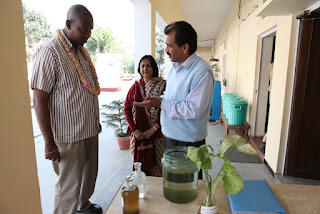Its funny, its only been like a week when I was having a drink with the Information Officer of the United Nations High Commissioner for Refugees when we had a heated yet friendly debate about the future of Tanzanian newspapers or rather their demise.
His take was that Tanzania newspapers are literally hanging on a thread and its only a couple of years for online publications to totally take over. He revealed to me that he had virtually stopped buying hard copies of newspapers and was reading everything online and it won't be too long until newspaper sales will hit rock bottom.
Personally I feel that newspapers will not suffer the same fate as that of dinosaurs of ever being extinct. I agree that there sales will drastically reduce as trends are already showing but disappearing altogether...naaaaa!
Reading
Rupert Murdoch's speech that he read in 2005 was sure a wake-up call and to be honest its quite interesting that what he said over seven years ago are now just starting to pop up in Tanzania.
As the Internet gets deeper rooted in the lives of people, evidence shows that consumers of news between the ages of 18-34 are increasingly using the web as their medium of choice for news consumption.
Statistics show that only 9 percent describe newspapers as trustworthy, a scant 8 percent find newspapers useful, and only 4 percent of respondents think newspapers are entertaining.
Stop for a minute and try to ingest this information. Without being too rude, these numbers simply say that we in this profession and business are feeding crap (to put it mildly) to our audience and that we don't have the faintest clue who these people are and what they want.
Allow me to quote from Mr Murdoch's speech.
"Thinking back to the challenge that television posed to the newspaper business, we can see some similarities. A new technology comes along, and like many new things, it is somewhat exciting at first, simply by virtue of being new. Like the advent of radio before it, television was always going to be at best an alternative way to get the news, and at worst a direct competitor. There was no way to make it a part, or even a partner, of the paper.
That is manifestly not true of the internet. And all of our papers are living proof. I venture to say that not one newspaper represented in this room lacks a website. Yet how many of us can honestly say that we are taking maximum advantage of those websites to serve our readers, to strengthen our businesses, or to meet head-on what readers increasingly say is important to them in receiving their news?"
Again much as this speech was read seven odd years and for the American audience and setting, in today's Tanzania, these are the questions that we should be asking yourselves today. In many aspects of the Tanzanian society today, innovation and invention are two words constantly being used, it is my belief that with their right usage, newspapers and online edition can work hand in hand without the other losing out.
I totally agree with Mr Murdoch when he said that, "The challenge, however, is to deliver news in ways consumers want to receive it. Before we can apply our competitive advantages, we have to free our minds of our prejudices and predispositions, and start thinking like our newest consumers".
Murduch couldn't have put it better when he said," The challenge for us – for each of us in this room – is to create an internet presence that is compelling enough for users to make us their home page. Just as people traditionally started their day with coffee and the newspaper, in the future, our hope should be that for those who start their day online, it will be with coffee and our website".
The battle is on, let's pick up our arms and charge!




































